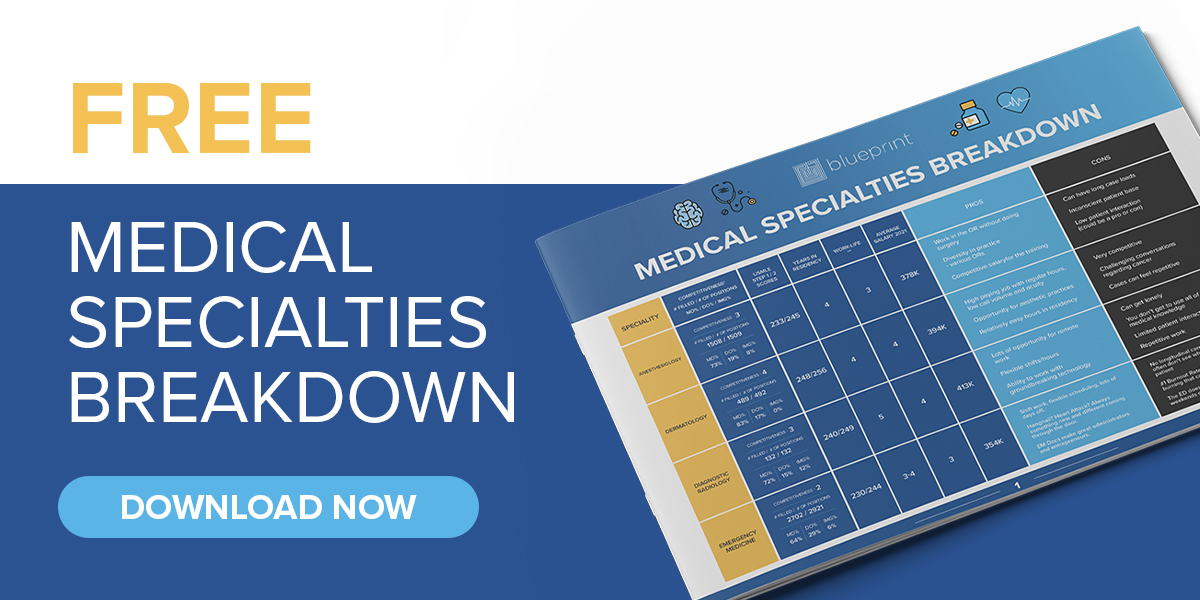Below is a conversation with an anonymous PGY-2 resident at an OB/GYN residency program. This post is part of our interview series with residents across various medical specialties to help medical students decide which path is right for them. Let’s dive in!

For a side-by-side comparison of each medical specialty, check out this FREE Medical Specialties Breakdown download including required exam scores, salaries, and more!
What is your favorite part of OB/GYN residency?
Okay so hands down, my absolute favorite part of OB/GYN residency is that you get to be both a surgeon and a primary care provider! It is a very unique privilege to be able to operate while also developing long-term relationships with patients.
On top of all of that, the feeling of delivering a baby and handing them to the mother to hold for the first time…there’s really no moment more magical than that, if you ask me! Plus, the patient population is relatively healthy, so I like that aspect of it as well.
Were you considering any other specialties?
I was very conflicted in medical school because I loved outpatient rotations like family medicine and the continuity of care that comes with that. But, I also really loved general surgery and the feeling of seeing a problem and fixing it with your own hands. I never even considered OB/GYN at first—it kind of snuck up on me, but it definitely allows me to do both.
Here’s a fun story: my first-ever delivery during med school rotations was a patient who had herself been delivered by the same attending physician! I thought it was so cool that you could work with families for multiple generations and create those special types of bonds.
Are you happy with your OB/GYN residency program?
I am not going to sugar-coat it, residency is hard. The hours can be exhausting, draining and emotionally and physically challenging.
That being said, I wouldn’t trade it for anything. I think I have the best job in the world and am very happy. I love getting to deliver babies, keep moms and (and babies!) healthy during pregnancy, counsel women on women’s health topics, and be in the OR doing gynecologic surgery.
Everyone handles the stresses of residency differently so it is very important to have outlets for stress, to try to balance your life, and reach out for help if you’re feeling overwhelmed.
Also, some people change their minds when they get to residency. I know people who realized their chosen field was not for them and switched to another specialty. It happens more often than you think—one of my best friends switched from general surgery to OB/GYN!
What fellowships can you pursue after residency? Are you considering any?
Reproductive endocrinology and fertility (REI) is my personal interest, which is an additional three years of fellowship training after four years of OB/GYN residency.
Another popular fellowship is maternal-fetal medicine (MFM) which a lot of my co-residents are interested in and that one is another three years after OB/GYN residency.
Other fellowships include gynecologic oncology, minimally invasive gynecologic surgery, urogynecology, or family planning. Lots of options (and additional years of training) depending on your interest!
What advice do you have for medical students interested in OB/GYN residency?
In your first two years, just get out there and shadow. Talk to OB/GYN physicians, get involved in research projects, you can always reach out to your third-year OB/GYN clerkship director and medical students in years above you who are going into the same specialty. Try to do your third-year OB/GYN rotation early to make sure that it’s the field you want to pursue. Best of luck on your journey!
Find more interviews with residents in these other Blueprint Med School posts!





